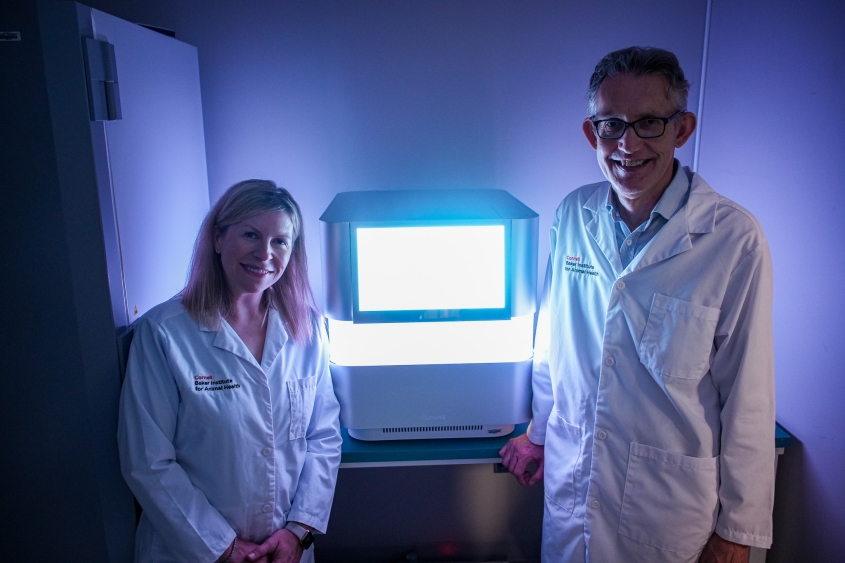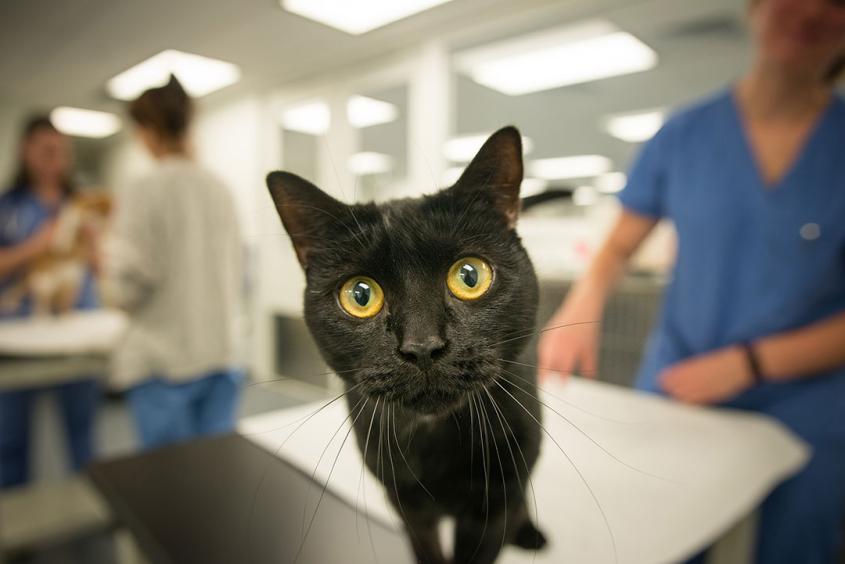Rapid Response
Rapid Response Fund takes aim at emergent threats to feline health
Bird flu is on the move—spreading among wild birds, poultry, dairy cows and, occasionally, humans. As cases in cats rise, the Cornell Feline Health Center (FHC) has mobilized its Rapid Response Fund (RRF), awarding nearly $400,000 to establish the Cornell Feline Health Center Feline H5N1 Consortium, a team of Cornell researchers focused on investigating the virus’ spread and impact on the species.
The grant is the latest of over a dozen supporting urgent, high-impact research on emerging threats to feline health that cannot await submission through the annual Cornell Feline Health Center grants program, which has provided over $7,000,000 in funding to feline -focused Cornell researchers in the past 25 years. Since its inception in 2012, the RRF has disbursed nearly $1,000,000 to Cornell researchers investigating emergent threats to cats. “This is all made possible by the kindness of our donors,” said FHC director Bruce Kornreich, D.V.M. ’92, Ph.D. ’05.
Closing the funding gap
The idea for the Rapid Response Fund emerged in 2012, when the newly identified feline morbillivirus in Hong Kong raised concerns that it might be contributing to chronic kidney disease in cats. John Parker, Ph.D. ’99, associate professor of virology at the Baker Institute for Animal Health and in the Department of Microbiology and Immunology, and Dr. Edward Dubovi, professor in the Department of Population Medicine and Diagnostic Sciences, launched a surveillance study to determine whether the virus was present in the U.S. cat population. It wasn’t.
“But this got us thinking,” said Kornreich. This emerging problem came between grant cycles, in which a year or more can pass between application and funding. “What could we do to quickly improve our ability to diagnose, treat, and prevent disease?”
The Rapid Response Fund was designed to close that gap. A streamlined review process enables researchers to access funding within weeks — ideal for fast-moving infectious diseases. “I believe it makes us unique,” said Kornreich. “I’m not aware of any other feline-focused institute that provides a similar funding mechanism.”
Read more about the history of CFHC Rapid Response.
Projects funded by the Rapid Response Fund to date:
2012, Ed Dubovi and John Parker, $2,000: The role of morbillivirus in feline chronic kidney disease.
2015, Christy Richards, $10,000: Genetic mechanisms of feline lymphoma.
2018, Gary Whittaker, $27,927: Molecular characterization of feline coronavirus in cats diagnosed with feline infectious peritonitis (FIP).
2020, Gary Whittaker, $3,000: Supplemental support for the development of a novel RNA In Situ hybridization test for FIP.
2020, Diego Diel, $20,000: Development of diagnostic testing tools for SARS-CoV-2 in cats.
2020, Patrick Carney, $18,650: Prevalence of SARS-CoV-2 infections in cats presented to the Cornell College of Veterinary Medicine for elective ovariohysterectomy.
2021, Diego Diel, $17,500: The role of hypertrophic cardiomyopathy on SARS-CoV-2 infection susceptibility in domestic cats.
2023, Laura Goodman, $19,894: The prevalence of H5N1influenza virus in commercial cat food.
2024, Gary Whittaker, $30,000: Surveillance, molecular characterization, antiviral drug resistance testing, and receptor-binding studies (infectivity assays) of Type 2 feline coronavirus isolates from FIP infections in the US and Cyprus.
2024, Amandine Gamble, $20,000: Surveillance and risk assessment for canine distemper virus infection in a population of community cats in New York City.
2024, Gary Whittaker, $68,057: Molecular analysis of the role of viral spike protein in the mechanism of infection, tissue distribution, and host immune response of a novel, highly pathogenic form of feline coronavirus (FcoV-23) causing an FIP outbreak in Cyprus.
2024, Laura Goodman, $100,000: Support for continued and expanded surveillance for FCoV-23 and other emerging viruses in community cat populations in large urban areas of the US.
2024, Laura Goodman, $166,160: Purchase of NextSeq 1000 sequencer (and associated maintenance contract) to facilitate improved and expanded molecular biologic testing for feline viral surveillance initiatives.
2025, Gary Whittaker, $60,009: Characterization of the molecular mechanism of preferred H5N1 influenza virus infection (tropism) for the feline nervous system.
2025, Establishment of the Cornell Feline Health Center Feline H5N1 Consortium, $387,064: Monitoring the prevalence and evolution of H5N1 infections in cats, predicting changes in viral infectivity and response to antiviral drugs.







 Rapid Response Funding: When Covid-19 struck, we took action
Rapid Response Funding: When Covid-19 struck, we took action